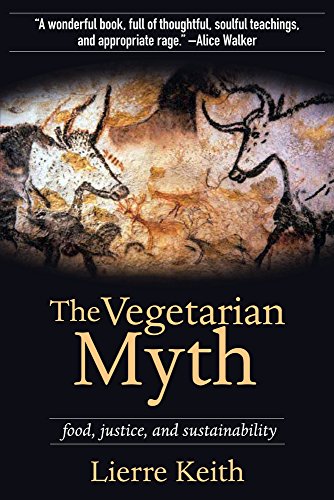As a libertarian who discovered the paleo approach to health a couple of years ago, I’ve been pleasantly surprised to find a solid contingent of libertarians in the paleo community. I’ve come to call such people paleo-libertarians (the hyphen distinguishes us from the paleolibertarians). Some of the big names in the paleo movement are principled anti-statists, including Kurt Harris, Richard Nikoley, and Don Matesz. Paleo is rapidly gaining popularity, and there are a growing number of paleo-libertarians.
Paleos Against the State
In fact, the paleo health community is astonishingly libertarian, if only unconsciously so. Of course, there are many statists, but the libertarian presence is disproportionately large. Paleos generally reserve a special hatred for the state. After all, the state and its allies in academia and industry are spreading deadly health advice that is responsible for the bulk of disease and obesity, and it continues to do so in the face of a growing mountain of evidence contradicting it. It should have been obvious from the start that the conventional wisdom was bogus – it totally contradicts evolutionary biology. The conventional recommendation to avoid red meat and animal fat, for example, flies in the face of over 2 million years of evolutionary adaptation to eating animals (the whole animal, including all of the fat). The recommendations to eat grains and vegetable oils are also suspect – grains were only introduced into the human diet about 10,000 years ago, and vegetable oils haven’t even existed for more than a century. The state’s health advice is not only wrong, but directly harmful to health. That makes the state responsible for an unfathomable amount of misery and death. For paleos, this elicits a deep mistrust in the state – how can they trust that the state doesn’t screw up this badly in anything else it does?
 The Primal Blueprint: ...
Best Price: $1.25
Buy New $4.70
(as of 12:45 UTC - Details)
The Primal Blueprint: ...
Best Price: $1.25
Buy New $4.70
(as of 12:45 UTC - Details)
Government As Usual
 Good Calories, Bad Cal...
Best Price: $2.00
Buy New $5.97
(as of 01:00 UTC - Details)
Good Calories, Bad Cal...
Best Price: $2.00
Buy New $5.97
(as of 01:00 UTC - Details)
In his paradigm-shifting book, Good Calories, Bad Calories, Gary Taubes explains how government involvement in the field of public health distorted the science to the point that it can hardly be called science anymore. In the 1970s, government agencies driven by political motives began promoting low-fat diets on the basis of very weak evidence. Researchers soon found it difficult to receive government funding if they challenged the official position. This spawned the low-fat dogma that is still with us today, despite being an utter dead-end. Taubes shows that the low-fat diet was a complete failure, providing zero benefit and causing substantial harm. He stresses that the diseases of civilization – heart disease, diabetes, cancer, obesity, hypertension, and many more – are practically non-existent in primitive populations until they adopt western foods. They are completely optional diseases which develop due to chronic bad nutrition. The state has been a major force in shifting the diet away from that paleolithic staple – animal flesh – and towards such health hazards as grains and vegetable oils. Thus, the state deserves a large portion of the blame for the high incidence of the diseases of civilization.
This is precisely what libertarian theory would predict – government activity having unintended negative consequences. Libertarians are well aware that scientists are fallible and that science can be distorted by politics – economics and climatology being the paradigm examples. William Butos has developed an economic analysis of government interventions in science. He concludes that government activity disrupts the spontaneous order of the academic community to the detriment of scientific progress. So there is every reason to expect that the sciences of nutrition and disease, deeply infested with government involvement, will be riddled with errors. Chris Masterjohn’s article about the government’s war on cholesterol is a good example of this. Taubes, an acclaimed science writer, is not exaggerating one bit when he concludes that "the study of nutrition, chronic disease, and obesity" has become "an enterprise…that purports to be a science and yet functions like a religion."
 The Protein Power Life...
Best Price: $1.25
Buy New $5.42
(as of 01:25 UTC - Details)
The Protein Power Life...
Best Price: $1.25
Buy New $5.42
(as of 01:25 UTC - Details)
Ideological Parallels
There are several interesting connections between paleo health and libertarianism. What I call the "Austrian connection" was uncovered by Gary Taubes in his research on the study of obesity. He found that the Austrian-German researchers had worked out the basics of fat metabolism prior to WW2. But the war broke up their research community, and the negative associations with Austria and Germany after the war swept their research out of sight in the international community. From there, the American researchers started from scratch but were led astray by the simplistic caloric balance hypothesis. To this day, the long forgotten pre-war Austrian-German theories on fat metabolism remain superior to the mainstream theories. The parallel with Austrian economics is striking: it too was driven underground by the war, and it too remains superior to mainstream neoclassical economics.
 The Vegetarian Myth: F...
Best Price: $3.29
Buy New $10.93
(as of 05:25 UTC - Details)
The Vegetarian Myth: F...
Best Price: $3.29
Buy New $10.93
(as of 05:25 UTC - Details)
Paleo and libertarianism also share similarities on the theoretical level. Both are based on the logic of spontaneous or unplanned order. Paleos recognize that humans are products of evolution and are adapted to the conditions of the evolutionary environment. Libertarians recognize that markets are far superior to government for bringing about social cooperation and coordination. Both emphasize that we deviate from these complex orders at our peril. As a result, both hold simple principles as solutions to entire categories of problems. Paleos hold the Paleolithic Principle as the solution to virtually all health problems and as the key to optimal health. Libertarians hold the Non-Aggression Principle as the solution to virtually all social problems and as the key to prosperity.
Finally, paleo and libertarianism share a common bond in individualism. Both value personal responsibility and oppose government paternalism, wanting nothing from the government except to be left alone. Both recognize that nothing good can come from using the political means to further their cause.
Why Paleo Matters
The paleo health movement is growing at a spectacular pace, mainly because it is soundly rooted in the evolutionary logic and simply because it works so well. People with all sorts of ailments are "going paleo" to effortlessly cure what the entire medical establishment has failed to prevent or treat. As the state invades and destroys the healthcare market, it is becoming ever more important to stay healthy and avoid dependence on the medical apparatus. And for those libertarians who want to live to see a free society, paleo health offers the surest way to achieve Misesian longevity. It saddens paleo-libertarians that Murray Rothbard was struck down by a disease of civilization at the young age of 68. It is important that libertarians do their best to avoid such a fate – the libertarian cause is too important.
 Paleo-Libertarian Integration
Paleo-Libertarian Integration
Given the many connections between the two, I think there is much to gain from paleo-libertarian integration. Paleos gain a theoretical understanding of how the "experts" can all get it wrong when science becomes politicized. More importantly, they gain an understanding of the root cause of the problem – government – and the ultimate solution – liberty. Paleos would greatly benefit from free markets: insurance companies would offer incentives for staying healthy, and there would be no subsidies propping up harmful foods nor regulations hindering healthy foods. Libertarians gain personally in terms of health and longevity. They also add another potent argument to the already formidable case against the state. And of course, both benefit by expanding their sphere of influence. Here’s to paleo-libertarianism: no grains, no government!
June 9, 2010




